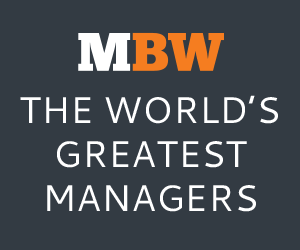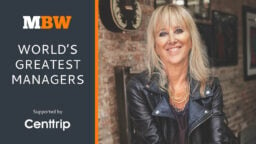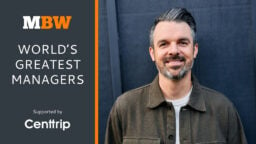MBW’s World’s Greatest Managers series profiles the best artist managers in the global business. Here, we speak to Jonathan Daniel, founder of Crush Management, home to, amongst others, Fall Out Boy, Weezer, Green Day, Miley Cyrus, Lorde and Sia (and next week we hear from his business partner, Bob McLynn). World’s Greatest Managers is supported by Centtrip, a specialist in intelligent treasury, payments and foreign exchange – created with the music industry and its needs in mind.

One of the most common themes – and commonly accepted truisms – on the modern music industry’s evolutionary path is the shift in roles and responsibilities between record label and manager.
This shift is, of course, intertwined with other changes – technological, contractual, structural – but the generally accepted bottom line is that in terms of A&R, marketing, PR, promo, etc. managers have (willingly, and often in return for more reward) taken on more heavy lifting in recent years.
Certainly, whenever MBW asks any of our World’s Greatest Managers to consider how their jobs and lives have changed since they started out, they will very often cite an increase in workload and a widening of remit. “We do a lot of what the label used to do,” is the typical, pared back reply.
Not Crush founder Jonathan Daniel, however.
Reflecting on what’s changed for him in the 20 years since he launched the company alongside Bob McLynn, Daniel says, simply: “Not that much.”
He’s no flat-earther, though. On the contrary, he’s suggesting that the modern way has always been Crush’s way, and that self-reliance was one of the firm’s founding principles.
“We set the business up from day one to control everything, and that meant doing everything. That’s how we do it now and that’s how we did it then. It’s more like the [music] business came round to our way of doing things.
“I can imagine for a lot of managers it’s really hard today if they were used to relying on the label to do everything.”
Daniel started out as bass player/songwriter in late eighties/early nineties could-a-been LA rock band Electric Angels (signed to Atlantic, managed by Kiss guitarist Bruce Kulick, produced by Tony Visconti).
When they split in 1992, Daniel was initially somewhat lost.
“I was on the wrong side of 35, I wasn’t gonna get any more record deals, but I wanted to stay in the music business. So, I started producing other bands, and when they started getting record deals they would ask me to manage them, but I would say, ‘No, I don’t know how to manage!’
“I could see the music business was going to change. Artists were going to have more control.”
“And then when Napster hit, I thought maybe I could be the manager, and just do it my way. I could see the music business was going to change: Artists were going to have more control, gatekeeping wasn’t going to be what it was. And so that’s how and why I started [in management], with the idea that I should just do it the way I would do it as an artist, but also with the timing of the rise of the internet.”
Daniel’s initial strategy, he says, was to look for “artists who were like me, but more talented”. Pretty soon, he found exactly what he was looking for…
You’ve described Fall Out Boy as the band on which Crush was built. How did you come to manage them and then break them so big?
I was looking for like-minded artists who had the same spirit and ambition that I had, and Fall Out Boy had it in spades.
And then Pete [Wentz] brought in Panic! at the Disco, Gym Class Heroes and some other bands, all of whom were either his friends or that he’d found. This whole scene built up.
And you found yourselves at the center of it…
A hundred per cent. And it’s also how Crush came to be Crush.
When I met [business partner] Bob [McLynn], he was just out of a band, he was looking to become a manager, and the first band we worked on together was Fall Out Boy.
He carried them on his back for the first couple of years. Basically, he did such a great job, it made sense to go: let’s just do everything like this.
Did you always set out to create a management company rather than ‘just’ be a manager?
[Laughs] Well, I called the company Crush because it sounded big – but I don’t think I had planned it out that much.
Bob and I weren’t in it for the money. Our primary goal wasn’t: how can I be rich? It was: how can we keep having hits, and how do we sustain our artists’ careers? So when we got that first flush of money, we put it back in the company, not in our pockets.
The other thing we realized was that the more we were in control of, the better we could do our jobs, the better we could help the artists.
So we invested in people we needed, like marketing people and radio people etc. That whole principle really helped the company and allowed us to grow into what we became.
How do you and Bob complement each other in terms of personalities?
I think we’re opposites. Some people see it as good cop/bad cop, but I don’t think that’s accurate at all. It’s more like a yin-yang thing.
I mean, look at us! I’m short with a full head of hair; Bob’s tall with a shaved head. I have no tattoos; he has arm sleeves. We’re just so different. We hear music differently. Everything about us is different. But I think when we come together, we make a whole.
What do you admire most about Bob?
I think it’s his conviction. Things might tend to drift if it was just me in charge. A big part of success is discipline, and Bob brings that.
“It’s a bizarre A&R set-up, because if you know us, and you know our tastes, you wouldn’t think we’d ever like the same song. But when we do, it’s a smash.”
It’s a bizarre A&R set-up, because if you know us, and you know our taste, you wouldn’t think we’d ever like the same song. But when we do, it’s a hit.
What are the signings you’ve made that have moved the needle for Crush, either in terms of scale or in terms of defining who you are?
After that initial burst with Fall Out Boy and Panic!, I had this idea that the music industry abandoned artists before the public did, whether that be the Bee Gees or Aerosmith, bands who made these fantastic comebacks.
I felt like we should try [to rectify] that. And that’s when we met Pat [Monahan] from Train.
That was a huge leap forward for us, because it made it so we weren’t just the emo guys. Train was the furthest you could get from that music.
And then for me, personally, just in terms of how people saw the company, the biggest leap was Sia. We had never done a female artist, we had never done a solo artist. Meeting and working with Sia taught me how to be a much better manager and a much better person, because she is such a great artist and such an interesting character.
“I felt terrible for her, she just seemed so sad, and didn’t want to do music anymore.”
She has Graves’, which is a hyperthyroid condition brought on by stress; basically the music business was killing her. And when we met, I was like, I don’t know if I’m the right manager for you. And she was like, yeah, I know, you manage boy bands [laughs].
But I told her I thought I could help her with her problems. Because I felt terrible for her, she just seemed so sad, and didn’t want to do music anymore.
So I said, ‘Well let me just be your friend, let me help you out of some bad situations.’ And that really allowed me to understand her and to understand how to manage artists differently.
I would ask her, ‘What’s the thing that bugs you most about the music business?’ And she would say, ‘I hate being manipulated.’ I was like, ‘Holy shit, that’s everything the music business is!’
It’s funny, because I think people still see us as ‘alternative’ managers, which is maybe true in that we do like pop music, but we really like left-of-center pop music.
Talking of left-of-center pop stars, your most recent signing is Miley Cyrus, how did that come about?
Well, just on that, the thing that has been surprising to me was that I initially thought she was a straight down the middle pop star. I didn’t know she wrote, I didn’t really know much about her.
I had met her mom, Tish, when Noah Cyrus was looking for a manager, and I eventually met Miley through her.
I went to the house and there’s all these people running around, it almost felt like we were in a movie. Like, there’s this cast of characters around her with huge personalities. I was just watching mostly!
And what I realized was that Miley is so much more like the artists that [Crush] gravitates towards. She really is, as we said before, left-of-center.
And it’s been super fun, because she is so into music. The things that we go back and forth on musically are not what you would expect. She sends me so much super cool stuff, wild records that I don’t know. And I know a lot of records!
I feel like she’s making a great album right now, and an album that I don’t know I’d have expected her to make before meeting her.
How did you come to manage Green Day?
Their lawyer called me and asked me if I’d take a meeting [following the band’s split with long-term manager Pat Magnarella in 2017]. I was like, about what?! And he said, ‘Well, they’re thinking about managing themselves, but I’ve told them, even LeBron James needs a coach.’
My view was that it sounded like the best meeting ever, because I was such a huge Green Day fan, but, equally, I had nothing to lose; they’re gonna manage themselves anyway, so that’s cool, I’ll just be myself.
“most people would pay a lot of money to do my job. Because my job is to hang out with Billie Joe Armstrong and Miley Cyrus and Sia and Lorde and Rivers Cuomo…every day! That’s my actual job!”
I mean, all of this… honestly, every day, I pinch myself, because my job is hilarious [laughs].
It’s amazing, you know; my job is to hang out with and talk to Billie Joe Armstrong and Miley Cyrus and Sia and Lorde and Rivers Cuomo…every day! That’s my actual job! Most people would pay a lot of money to do that job!
What do you think has been the biggest change in artist management over the last 20 years?
The broad strokes of management, I think, are still the same: make great records, have a great strategy, help inspire artists, and just figure out how to get things through.
Like, where’s the side door? If your management plan right now is to try and get [your] record to blow up on TikTok, you don’t have a plan.
Is one tangential change from the past to now a bigger priority on artists’ mental health and well being?
100 percent. So many artists get shot out of a canon, and not everyone is built for that. Miley, she’s built to compete, she’s like an Olympic athlete in that regard. It’s incredible how hard she can go.
Whereas with other artists, the pressure’s too much. You have to treat everyone as an individual and tailor everything around them, with their best interests at heart, in every way.
There’s a Fall Out Boy record, Folie à Deux [2008], which is about the madness of two people, like when one person is sick and the other person feels the pain. I think about that a lot, and it’s so true of how management is, because when the artist is in a dark place, then, yeah, it definitely hurts.
How hard is it to break artists these days?
I think perhaps it’s easier to have a hit and harder to break an artist, just because of the way the playlist ecosystem can blow up a track really quickly.
You know, if your song works on playlisting, it can really go fast – but it doesn’t necessarily mean you’re ever gonna have another one
what do you think of the trend for songwriters to sell their catalogs?
I definitely understand why people do it, especially older artists. And we’ve all seen the catalog values go up and up. But we’d rather artists bet on themselves to have their success continue.
Merck [Mercuriadis, founder of Hipgnosis] is one of the leaders in that area, and I really liked how he’s bringing back sort of like the old maverick music business guy; I think that’s fun, regardless of the business model. It feels a lot more fun than data analysis.
Talking of the zeitgeist, what do you think of NFTs? Are they are huge opportunity for artists or is there a whiff of snake oil in the air?
I don’t think it’s snake oil, no. But for me it’s music-adjacent. I think it’s incredible for digital artists. Because before you couldn’t really build a fan base. You could do merch designs for an artist or whatever, but there was no way to be a rock star of digital art. Now there is, and that’s amazing.
But for me, so far, in music, there hasn’t been anything super-innovative or interesting. You know, selling shares in a song and all that stuff is fine, but you could do that without the blockchain.
I don’t know that most artists are that excited about that. I think in terms of Web3 they’re more excited about the idea of the big audience in gaming. We did a Weezer Island in Fortnite and that was great.
With NFTs, we’ve done a couple of things, and we have one coming that’s super exciting, but they’re not music-based; they’re art-based.
What are the biggest projects ahead of you for the rest of 2022?
There’s Hella Mega, the biggest and best tour that we’ve ever done [featuring Green Day, Fall Out Boy and Weezer], which is heading to Europe. And then everybody’s working on music.
We have four Weezer albums coming, based on the different sounds and moods of the different seasons of the year, with spring being the first one. [Weezer’s SZNZ series kicked off with the release of Spring in March.]

Green Day are heading to London to record some new music. There’s a Lorde tour starting next month. I think all the tickets sold out like the first day we put them on sale, but then it’s been like a year of waiting because of COVID, so that’s going to be really special.
I have the best week ever lined up in the UK later this year: I have the Hella Mega tour, I have Alanis [Morissette] at the O2 and I have Lorde at Glastonbury and the Ally Pally [Alexandra Palace]. It’s my triumphant return to London!
What’s been the proudest moment of your career so far?
Wow, that’s hard… The first was fall Fall Out Boy at a sold-out arena in Buffalo, with all the kids singing along. This was kind of before they were mainstream, and there were 15,000 people singing every word. I just thought, man, this little band is doing it for all the other little bands who never got past the basement.
And there have been so many since then. Like with Sia, when she made the Chandelier video, I called her and she said, ‘This is the best thing I’ve ever done.’ I said, ‘The best video?’ She said, ‘No, the best thing. Ever.’ And then she sent it to me and I was like, ‘Oh my God, this is gonna change everything.’ And it did!
Also, definitely Melodrama [Lorde, 2017] getting nominated for a Grammy was a big one. Because she was coming off Royals [from 2013’s Pure Heroine] being one of the biggest songs of all time.
Everybody was like, ‘Where’s the hit? You don’t have a hit on this record’. And that record [Melodrama] is now so beloved. Basically, if you can avoid the sophomore slump, you can do anything you want. And if you can’t, you probably won’t have a career; you’ll be singing Royals for the rest of your life. So that was big.
And then more recently, Hella Mega, for sure. These are three headline bands who risked a lot to be on the same bill. But from show one, it has been incredible.
What would be your advice to a young manager starting out?
I don’t know about advice, but what I would tell them is that if I have a great song, my job is easy; if I have a good song, my job is impossible.
There’s too much good music in the world; aim for great.





